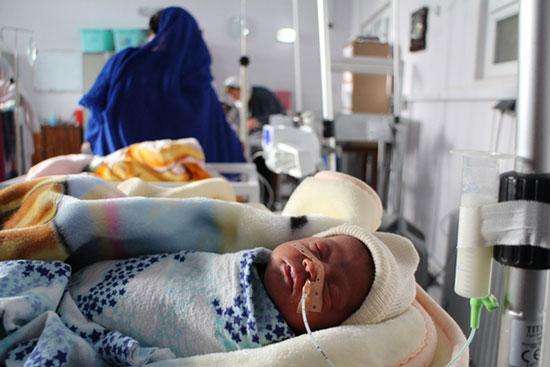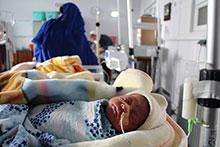Giving birth in conflict-torn Afghanistan is costly and dangerous. MSF runs a hospital in Khost province that provides free maternal care.
Zukia* is 21 years old and lives in the Afghan border province of Khost, which has been deeply impacted by the conflict in Afghanistan over the past decade and remains insecure. The region where Zukia lives only has a limited number of medical facilities, which is troubling because medical needs in Khost are enormous and the rate of maternal mortality is especially high.
There is a public hospital located outside the provincial capital, which is also called Khost, but the distance and the cost of transport are prohibitive for some. Additionally, women from more traditional communities prefer not to go there because the surgical staff is male.
There are small private clinics near her home, but Zukia doesn’t have much confidence in them. She gave birth to her first two children in another private clinic several hours away. It cost her between 4,000 and 5,000 Pakistani rupees, which is roughly $38 to $48 at current exchange rates.
This is all very relevant to her because Zukia is expecting another child, and because her husband was killed by an explosion in Kabul during her first trimester of pregnancy. Aside from the cost and distance, she’s concerned with safety as well, especially on the roads. “In the area where I live, there is a lot of fighting,” she says. “We hear shooting all night.”
Her worries highlight the lack of affordable and accessible maternal care for many women in Khost. The cost leads some women to try to deliver at home, where they run the risk of severe consequences if there are complications. The safety concerns mean that some women won’t seek medical attention until it’s too late.
It was just these issues that led Doctors Without Borders/Médecins Sans Frontières (MSF) to open a maternity hospital in Khost city in early 2012 with medical teams consisting exclusively of women.
There were problems at first. Barely six weeks after the hospital opened, MSF had to suspend activities when an explosion inside the compound itself injured seven people. MSF took time to reassess the situation and to strengthen its network to ensure greater support from the community and all the political and religious leaders in the area. Programs re-opened this past December.
MSF focuses on care for pregnant women and newborns, with surgical capacity for complicated deliveries. Care is provided at the hospital free of charge. The objective is to raise the level of health care provided in the province, without duplicating existing services.
The team now assists around 1,000 deliveries per month in the 56-bed hospital; nearly 20 percent of them are complicated deliveries. Overall, the teams have performed more than 5,500 deliveries since programs resumed last December.
For Zukia, that meant she had a place to go when the time came, a place where she could get the care she needed. In fact, she was already in labor when we met her. “I can feel the contractions,” she said. “It is four days since they started, and it’s getting more and more difficult to bear. I asked the doctor and midwives for a Caesarean section because I find it harder and harder to bear the contractions. I am afraid of complications, but the doctor told me that I will have a normal delivery.”
A few hours later, Zukia delivered her baby safely.
*Name has been changed to protect the patient’s privacy





